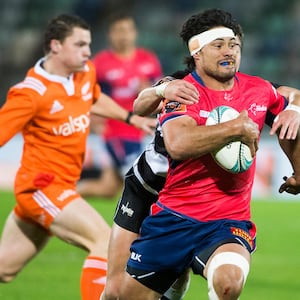Politics
Father of CTE Victim Criticizes NZ Rugby After Shane Christie’s Death

The death of former Māori All Black Shane Christie has prompted strong reactions from advocates for head injury awareness, particularly from the father of a player affected by Chronic Traumatic Encephalopathy (CTE). Christie, 39, passed away suddenly in Nelson on the morning of March 27, 2024. Friends have indicated that his death may have been self-inflicted, occurring during a period of heightened concern for his mental health.
Christie, who was the captain of the Tasman Mako and played for the Highlanders in Super Rugby, was known for his tenacity and dedication to the sport. Following his rugby career, he became a vocal advocate for increased awareness regarding the impacts of repeated head injuries, particularly the long-term effects associated with CTE. In an interview with the *Herald* last year, Christie expressed his desire for his brain to be examined posthumously to determine if he had developed CTE, a degenerative brain condition linked to multiple concussions.
Calls for Change in Rugby Safety Protocols
The reaction to Christie’s passing has been profound, with many highlighting the urgent need for reforms in rugby safety measures. Billy Guyton, whose son suffered from CTE and ultimately passed away, described Christie’s death as “another kick in the guts” for those advocating for safer practices in sports. Guyton has been an outspoken critic of New Zealand Rugby, urging the organization to take more substantial steps to protect players from the dangers of head injuries.
The conversation surrounding CTE has gained momentum in recent years, with numerous athletes speaking out about their experiences and the potential long-term consequences of concussions. Advocates like Guyton argue that more research and improved protocols are essential to safeguarding the health of current and future players.
Christie’s legacy in rugby is remembered not just for his on-field achievements but also for his commitment to raising awareness about the risks associated with the sport. His dedication to this cause has inspired many within the rugby community to advocate for change.
As the investigation into his death continues, the rugby community is left to reflect on the importance of mental health and the impact of head injuries in sports. The hope is that Christie’s story will encourage a broader dialogue about player safety and lead to meaningful changes within the sport.
In the wake of this tragedy, calls for accountability and reform are expected to grow louder, as more individuals recognize the critical need for action in addressing the ongoing issues related to head injuries in rugby and other contact sports.
-

 World3 months ago
World3 months agoTest Your Knowledge: Take the Herald’s Afternoon Quiz Today
-

 Sports3 months ago
Sports3 months agoPM Faces Backlash from Fans During Netball Trophy Ceremony
-

 Lifestyle3 months ago
Lifestyle3 months agoDunedin Designers Win Top Award at Hokonui Fashion Event
-

 Sports3 months ago
Sports3 months agoLiam Lawson Launches New Era for Racing Bulls with Strong Start
-

 Lifestyle3 months ago
Lifestyle3 months agoDisney Fan Reveals Dress Code Tips for Park Visitors
-

 World3 months ago
World3 months agoCoalition Forms to Preserve Māori Wards in Hawke’s Bay
-

 Health3 months ago
Health3 months agoWalking Faster Offers Major Health Benefits for Older Adults
-

 Politics3 months ago
Politics3 months agoScots Rally with Humor and Music to Protest Trump’s Visit
-

 Top Stories3 months ago
Top Stories3 months agoUK and India Finalize Trade Deal to Boost Economic Ties
-

 World3 months ago
World3 months agoHuntly Begins Water Pipe Flushing to Resolve Brown Water Issue
-

 Entertainment3 months ago
Entertainment3 months agoExperience the Excitement of ‘Chief of War’ in Oʻahu
-

 Science3 months ago
Science3 months agoNew Interactive Map Reveals Wairarapa Valley’s Geological Secrets









